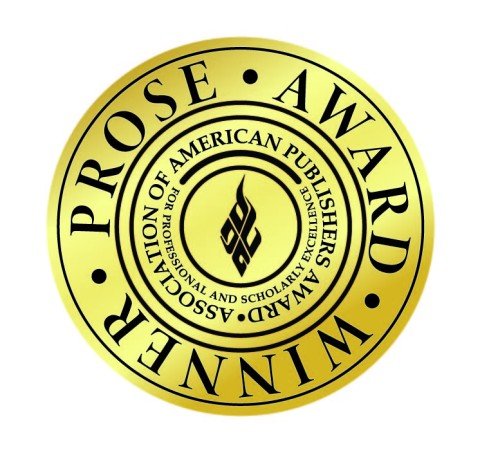Winner of the 2022 Prose Award in the category of:
MUSIC & THE PERFORMING ARTS
Liner Notes for the Revolution: The Intellectual Life of Black Feminist Sound
Since 1976, the Association of American Publishers Awards for Professional and Scholarly Excellence (PROSE Awards) have recognized the very best in professional and scholarly publishing by celebrating the authors, editors, and publishers whose landmark works have made significant advancements in their respective fields of study each year.
Winner of the Deems Taylor/Virgil Thomson Award for an article in the pop music field is presented to Daphne A. Brooks for “100 Years Ago, 'Crazy Blues' Sparked a Revolution for Black Women Fans,” published in The New York Times.
Pitchfork Best Music Books of 2021
Liner Notes for the Revolution: The Intellectual Life of Black Feminist Sound (Harvard UP)
Yale professor Daphne A. Brooks’ third book is a sweeping survey of Black womenLiner Notes for the Revolution: The Intellectual Life of Black Feminist Sound’s contributions to music history and a rigorous mapping of their lives as intellectuals. From Bessie Smith to Beyoncé, Brooks issues a monumental corrective to how Black women are “too rarely held as makers of rare sounds deemed deserving of excavation and long study,” and dares us to imagine a culture that puts Black women at its “full-stop center.”
Pitchfork | November 22, 2021
Rolling Stone Best Music Books of 2021:
Liner Notes for the Revolution: The Intellectual Life of Black Feminist Sound (Harvard University Press)
“Yale professor Daphne Brooks takes on a wide-ranging study of Black female artists, from elders like Bessie Smith and Ethel Waters to Beyoncé and Janelle Monáe. But she reaches far beyond music, exploring writers like Zora Neale Hurston and Pauline Hopkins; there’s a chapter about an early interview between the playwright Lorraine Hansberry and the rock critic Ellen Willis. Liner Notes is a secret history in the spirit of Greil Marcus, connecting the sonic worlds of Black female mythmakers and truth-tellers. One of the most touching moments: Brooks’ mother recalls record shopping as a spiritual refuge in the Jim Crow South of the 1940s.”
Rolling Stone | December 29, 2021
2021 PEN Oakland Josephine Miles Award for Nonfiction for U.S. multicultural writers, to “promote works of excellence by writers of all cultural and racial backgrounds and to educate both the public and the media as to the nature of multicultural work” for Liner Notes for the Revolution: The Intellectual Life of Black Feminist Sound (Harvard UP, 2021)
Boston Globe Summer Reading 2021 List for Liner Notes for the Revolution: The Intellectual Life of Black Feminist Sound (Harvard UP, 2021)
Brooks is a great music writer and cultural critic. Narrating the histories of American music and music criticism with Black women as the central voices and innovators, “Liner Notes” is a playlist doubling as intellectual history, written with love and joy.
— Walton Muyumba
Los Angeles Times Book Club
Favorite Literary Escapes of 2021:
Liner Notes for the Revolution: The Intellectual Life of Black Feminist Sound (Harvard UP, 2021)
Kirkus Reviews Best Nonfiction Books of 2021 List
“A spirited study of how Black women musicians and writers have informed each other despite gatekeepers’ neglect and dismissals.”
Kirkus Reviews | November 15, 2021
Winner of the 2021 MAAH Stone Book Award:
Liner Notes for the Revolution: The Intellectual Life of Black Feminist Sound.
Daphne Brooks in conversation with Lynell George for Skylit -- the Skylight Books podcast series.
Skylit | July 26, 2021
“‘From Bessie Smith to Beyoncé’ is the inescapable bumper-sticker on this hour of historical, musical radio. We’re talking about a century of Black female singers in the churn of gender, race, class, region, technology, and celebrity that drive the culture and the music biz. ”
Radio Open Source | July 15, 2021
"That’s how I think about Black feminist sound. It’s something that we ethically have a responsibility as scholars to identify as a resonance and meaning—both in the historical moment in which a particular expressive statement emerges and that exceeds that moment."
Ms. Magazine | June 29, 2021
“A thrilling and genre-expanding work of criticism, Liner Notes for the Revolution is a study not only of Black women musicians but also of the radical possibilities of listening, collecting, and curating as forms of intellectual and political labor.”
Bookforum | March 2021
"There have been many books about major African American figures in history and culture-making. But Liner Notes, which came out in February, examines both Black women music-makers and what Brooks calls, in a nod to Saidiya Hartman, “the chorus” — the Black women critics and collectors who inspire the music, listen to it, curate it, live with it, make love to it, analyze it, and tell us its stories."
Vulture | May 21, 2021
"This isn’t a traditional music history book, although, at one point, Brooks had considered writing 'a long, sweeping history of Black women and popular music culture.' Instead, she says, 'the book that I ended up writing is really about the story of why we’ve never had a book like that before.'”
Audiofemme | April 15, 2021
“Popular music culture is steeped in cultural memories and intimacies, the lifeworlds that we associated with the music and build with the music…. African American artists are so prone to turning to music as a kind of historical and archival recourse. It’s where and how they document individual as well as communal pasts when institutional libraries and museums and universities were gaslighting Black folks about having a relevant and significant past in American culture. These are the stakes involved in the music that I’m exploring. It’s challenging but also exhilarating to try to dissect all that in a book and from one performance and recording to the next.”
Music Journalism Insider | April 4, 2021
Interview
“How Black Women Musicians Define What We Call Culture”
The Nation | March 15, 2021
Thulani Davis and the Secret History of Women Writing Album Liner Notes
Since its inception in 1964, the Grammy for best album notes has been awarded to just three women. Davis, who won in 1993 for an Aretha Franklin boxed set, was the first.
—Daphne A. Brooks, The New York Times | March 12, 2021
“Written out of official archives, Black women artists and journalists provide a valuable rejoinder to whitewashed accounts of music history.”
— Stephanie Phillips, The Wire | March 2021 (Issue 445)
Liner Notes for the Revolution Excerpt
“Shifting the Center of American Music from Bob Dylan to Beyoncé Knowles”
JEZEBEL | Feb 25, 2021
“If the gender politics of teen melodrama are quickly evolving, the treatment of race is a different story. Since the ’60s, when Black girl groups helped turn the idea into commercial gold, teen melodrama has been largely embodied by young white women — one result of a society in which ‘Black children aren’t afforded the space to occupy the position of being young because the weight of the world is put on them,’ according to Daphne Brooks, a veteran cultural critic and professor of African American studies at Yale.”
Mikael Wood, The Los Angeles Times | Feb 24, 2021
Liner Notes for the Revolution Excerpt
"The Woman Who Preserved Zora Neale Hurston’s Musical Legacy”
Daphne A. Brooks on Rosetta Reitz, Grassroots Blues Activism, and Black Feminism
Literary Hub | Feb 24, 2021
“The audience, Brooks says, is an essential part of her study — the Black girls and young women who bought the records and enjoyed the music even if they rarely factored into the dominant cultural conversations about it.”
— Jennifer Szalai, The New York Times | Feb 17, 2021
“With the over 600 pages of Liner Notes for the Revolution, the Yale professor and former co-editor of the 33 ⅓ series, finds ways to glide between academically rigorous arguments the kind of insider knowledge usually reserved for merch table conversations.”
Aquarium Drunkard Book Club | March 25, 2021
100 Years Ago, ‘Crazy Blues’ Sparked a Revolution for Black Women Fans
— Daphne A. Brooks, The New York Times | Dec 2020
























